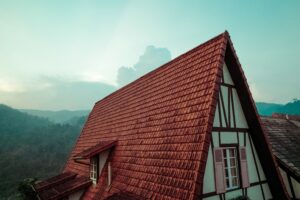
07708506553
Mon-Fri: 9am to 5pm

Mon-Fri: 9am to 5pm
Your roof is one of the most critical components of your home. It provides protection from the elements and keeps you safe and comfortable year-round. However, like any part of your house, it is subjected to wear and tear over time. Understanding the factors that can affect the lifespan of your roof is crucial for its longevity and your overall peace of mind. In this blog post, we will explore the key factors that influence the lifespan of your roof.

The quality of the roofing materials used during installation plays a significant role in determining how long your roof will last. High-quality materials, such as slate, metal, or clay tiles, tend to have a longer lifespan compared to asphalt shingles. Investing in durable and reliable materials upfront can save you from costly repairs or replacements down the line.
Even with top-quality materials, poor installation can significantly reduce the lifespan of your roof. Improperly installed flashing, inadequate ventilation, or improper fastening of shingles can all lead to premature roof failure. Hiring a reputable and experienced roofing contractor who follows industry best practices is essential to ensure proper installation and maximise the longevity of your roof.
The climate and weather conditions in your area have a profound impact on your roof’s lifespan. Intense heat, prolonged exposure to UV rays, high humidity, heavy rainfall, strong winds, and extreme temperature fluctuations can all take a toll on your roof over time. Different roofing materials have varying degrees of resistance to these elements, so it’s important to choose a material that is suitable for your local climate.
Regular maintenance and proper upkeep are crucial for extending the lifespan of your roof. Neglecting routine inspections, cleaning, and maintenance can lead to the accumulation of debris, moss, or algae, which can degrade the roofing materials. It’s important to clean gutters regularly, trim overhanging branches, and inspect for any signs of damage or leaks. Promptly addressing minor issues can prevent them from escalating into major problems.
Proper ventilation and insulation are often overlooked factors that can affect your roof’s lifespan. Inadequate ventilation can trap heat and moisture, leading to the deterioration of roofing materials and the formation of mould or rot. Similarly, poor insulation can cause ice dams to form in colder climates, leading to water damage. Ensuring proper airflow and insulation in your attic or roof space can help preserve your roof’s integrity.
The pitch or slope of your roof can impact its longevity. Steeper roofs tend to shed water more effectively and are less prone to water pooling, which can cause leaks or structural damage. Additionally, the design and complexity of your roof, such as the number of valleys, dormers, or skylights, can affect its vulnerability to leaks and the overall maintenance requirements.
Protecting the lifespan of your roof requires a combination of factors, including high-quality materials, proper installation, regular maintenance, and consideration of local climate and weather conditions. By understanding these factors and taking proactive steps to address them, you can significantly extend the life of your roof. Remember to consult with roofing professionals for guidance and ensure that your roof receives the care it deserves. By doing so, you can enjoy a durable and long-lasting roof that keeps your home safe and secure for years to come. To find out more about us and how we might be able to help you, or you would like some more information on roofing, roof maintenance, or roof restoration, we’d advise you to get in touch with us. That way, we can talk specifics with your specific requirements in mind. Call us on 07778 188 952, or fill out one of our online contact forms today!